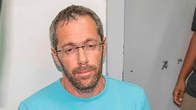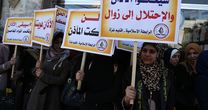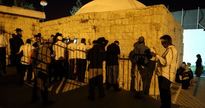7 oct 2017

The Palestinian Prisoners Center for Studies said that 450 Palestinians, including women and children, have been arrested since the outbreak of the Jerusalem Intifada in October 2015 on charges of "incitement" on Facebook.
Media spokesman for the Center, Riyad al-Ashqar, explained that Israel uses what Palestinian youths publish on social media sites as pretexts to detain them on charges of incitement and impose actual or administrative imprisonment sentences on them.
Ashqar pointed out that the detainees included journalists, children and women, adding that an administrative detention order was issued against the Jerusalemite female prisoner Sabah Fir'oun and renewed four times in a row for the same charge.
Ashqar said that Israel has established a special cyber unit to record all that is published by Palestinian youths. Israeli courts claim that posting statements honoring martyrs or videos documenting the Israeli crimes indicates a psychological readiness to carry out anti-Israel attacks.
He noted that the Israeli prosecution presents to the court a file containing dozens of printed Facebook posts as evidence of the Palestinians' willingness to harm Israel's security.
He cited the case of the Jerusalemite journalist Sanaa Dweik who spent 6 months in Israeli jails on charges of incitement because she used words like "Intifada" and "martyrs" in her press work though these terms are widely used in the Palestinian and Arab media.
In similar cases, the Israeli authorities imposed an administrative detention order that was renewed twice against the ex-prisoner Su'ad Erziqat, 28, and sentenced Ahmad Sa'ida, 17, to 11 months on charges of incitement on Facebook.
Since these arbitrary sentences were not enough for Israel, according to Ashqar, those released are ordered not to use Facebook for a certain period of up to months, and they may be fined or held in house arrest.
Ashqar stressed that arresting Palestinians because of their opinions is contrary to the international conventions and laws that allow freedom of expression, calling on the international community to intervene and put an end to the Israeli violations.
Media spokesman for the Center, Riyad al-Ashqar, explained that Israel uses what Palestinian youths publish on social media sites as pretexts to detain them on charges of incitement and impose actual or administrative imprisonment sentences on them.
Ashqar pointed out that the detainees included journalists, children and women, adding that an administrative detention order was issued against the Jerusalemite female prisoner Sabah Fir'oun and renewed four times in a row for the same charge.
Ashqar said that Israel has established a special cyber unit to record all that is published by Palestinian youths. Israeli courts claim that posting statements honoring martyrs or videos documenting the Israeli crimes indicates a psychological readiness to carry out anti-Israel attacks.
He noted that the Israeli prosecution presents to the court a file containing dozens of printed Facebook posts as evidence of the Palestinians' willingness to harm Israel's security.
He cited the case of the Jerusalemite journalist Sanaa Dweik who spent 6 months in Israeli jails on charges of incitement because she used words like "Intifada" and "martyrs" in her press work though these terms are widely used in the Palestinian and Arab media.
In similar cases, the Israeli authorities imposed an administrative detention order that was renewed twice against the ex-prisoner Su'ad Erziqat, 28, and sentenced Ahmad Sa'ida, 17, to 11 months on charges of incitement on Facebook.
Since these arbitrary sentences were not enough for Israel, according to Ashqar, those released are ordered not to use Facebook for a certain period of up to months, and they may be fined or held in house arrest.
Ashqar stressed that arresting Palestinians because of their opinions is contrary to the international conventions and laws that allow freedom of expression, calling on the international community to intervene and put an end to the Israeli violations.
6 oct 2017

Tal Silberstein, under investigation in Israel in corruption case surrounding billionaire Beny Steinmetz, opened Facebook pages meant to undermine Sebastian Kurz, who leads the right-wing Austrian People's Party; Silberstein doesn't deny reports but says a mole was implanted in his team.
Israeli political advisor Tal Silberstein is behind a smear campaign that has caused a political storm in Austria just days before the general elections in the country, according to Austrian media.
Silberstein, a former advisor to Israeli prime ministers Ehud Barak, Ehud Olmert and Benjamin Netanyahu, is reportedly behind particularly vitriolic Facebook pages, which he opened as part of his work for the Social Democratic Party of Austria (SPÖ).
The Facebook pages are not directly tied to the party's campaign, but they do target political rival Sebastian Kurz, who heads the right-wing Austrian People's Party, with content described to be "anti-Semitic and racist in part," according to Austrian newspaper Die Presse.
In an interview with Austrian media, Silberstein did not deny being behind the campaign but instead attacked his rivals and accused them of planting a mole in his team.
Austrian Chancellor Christian Kern, who hired Silberstein, denied having any knowledge of the dirty campaign, with Silberstein himself confirming Kern had no hand in it.
Silberstein was paid some 500,000 euros for his work for the SPÖ. He stopped working with the party in mid-August, when he was arrested in Israel in connection with the corruption case surrounding billionaire Beny Steinmetz.
Negative campaigns are usually considered taboo in Austrian elections. A Facebook page titled "The truth about Sebastian Kurz," which was opened by Silberstein but made to look like a page run by the radical right-wing in the country, claimed American billionaire George Soros, a central figure in anti-Semitic conspiracy theories, donated millions of dollars to Kurz's campaign.
The same page also mocked Kurz's age, presenting him as a baby. Kurz, who has been serving as Austria's foreign minister since 2013, was appointed to the role at age 27, making him one of the youngest foreign ministers in Europe.
Another Facebook page titled "We're for Sebastian Kurz" was portrayed as one run by a close associate of Kurz's party and featured posts with populist positions. For example, a photo of masses of refugees was accompanied with the caption: "Thousands of refugees are waiting in Italy and NGOs are threatening to bring them to Austria. Should Austria allow this?"
The page also posted about an opinion poll asking whether the main border crossing between Austria and Italy should be closed—a clearly populist position.
The elections are scheduled to be held on October 15. Kurz's Austrian People's Party is leading in the polls with 34 percent, compared to the SPÖ with only 25 percent.
Israeli political advisor Tal Silberstein is behind a smear campaign that has caused a political storm in Austria just days before the general elections in the country, according to Austrian media.
Silberstein, a former advisor to Israeli prime ministers Ehud Barak, Ehud Olmert and Benjamin Netanyahu, is reportedly behind particularly vitriolic Facebook pages, which he opened as part of his work for the Social Democratic Party of Austria (SPÖ).
The Facebook pages are not directly tied to the party's campaign, but they do target political rival Sebastian Kurz, who heads the right-wing Austrian People's Party, with content described to be "anti-Semitic and racist in part," according to Austrian newspaper Die Presse.
In an interview with Austrian media, Silberstein did not deny being behind the campaign but instead attacked his rivals and accused them of planting a mole in his team.
Austrian Chancellor Christian Kern, who hired Silberstein, denied having any knowledge of the dirty campaign, with Silberstein himself confirming Kern had no hand in it.
Silberstein was paid some 500,000 euros for his work for the SPÖ. He stopped working with the party in mid-August, when he was arrested in Israel in connection with the corruption case surrounding billionaire Beny Steinmetz.
Negative campaigns are usually considered taboo in Austrian elections. A Facebook page titled "The truth about Sebastian Kurz," which was opened by Silberstein but made to look like a page run by the radical right-wing in the country, claimed American billionaire George Soros, a central figure in anti-Semitic conspiracy theories, donated millions of dollars to Kurz's campaign.
The same page also mocked Kurz's age, presenting him as a baby. Kurz, who has been serving as Austria's foreign minister since 2013, was appointed to the role at age 27, making him one of the youngest foreign ministers in Europe.
Another Facebook page titled "We're for Sebastian Kurz" was portrayed as one run by a close associate of Kurz's party and featured posts with populist positions. For example, a photo of masses of refugees was accompanied with the caption: "Thousands of refugees are waiting in Italy and NGOs are threatening to bring them to Austria. Should Austria allow this?"
The page also posted about an opinion poll asking whether the main border crossing between Austria and Italy should be closed—a clearly populist position.
The elections are scheduled to be held on October 15. Kurz's Austrian People's Party is leading in the polls with 34 percent, compared to the SPÖ with only 25 percent.
5 oct 2017

Israeli law enforcement agencies are not revealing to detainees which of their social media posts led to the issuance of a warrant for their arrest and their subsequent detention, a press release said on Wednesday.
This practice is being employed disproportionally against Palestinian citizens of Israel and seriously impairs their ability to defend themselves, Adalah – The Legal Center for Arab Minority Rights, said in the release.
WAFA reports that Adalah sent a letter on September 11 calling on Israeli Attorney General Avichai Mandelblit and State Attorney Shai Nitzan to order Israeli police to disclose to suspects and their lawyers during pre-trial detention hearings the content of the social media posts that allegedly constitute a criminal offense, such as incitement and other crimes of expression.
Adalah Attorney Fady Khoury wrote in the letter that this policy severely harms suspects’ rights.
“This problematic practice essentially turns an initial arrest into a full-fledged administrative detention. It is not just that the evidentiary materials collected by police are kept from detainees and their lawyers, but that the [social media] content for which the arrest was carried out is left undefined,” he wrote.
“Just as it would be unthinkable to arrest someone suspected of theft without informing them or their lawyer during the pre-trial detention stage what they are believed to have stolen … and just as one cannot be arrested on suspicion of murder while the identity of the victim is left undisclosed until after an indictment is filed, so it is also in the case of an individual arrested on suspicion of committing a crime of expression involving a publication: there is a duty to inform suspects and their lawyers of the content of the expression, i.e. the ‘publication,’ on which the arrest warrant is based.”
Adalah’s letter included numerous examples of arrests of Palestinian citizens of Israel carried out for alleged crimes of expression, during the course of which the statements that formed the very grounds for the arrests were kept classified. For example, Razi Nabulsi, a Palestinian Arab citizen of Israel, was arrested on suspicion of “publishing a statement in support of a terrorist organization”, but Israeli police maintained a ban on release of Nabulsi’s statement that formed the basis for his arrest for the entire duration of his seven-day detention.
Attorney Khoury wrote: “The arrest of individuals suspected of incitement, for example – without revealing the statements that form the basis for the arrest – constitutes a serious infringement of suspects’ rights to due process, undermines the purpose of the criminal process, and severely s detainees’ rights to plead their case and defend themselves.”
The vast majority of arrests made in Israel in 2015 and the first half of 2016 for charges related to alleged incitement on social media outlets were of Palestinian citizens.
According to Israeli police statistics, 82 percent of individuals arrested for incitement-related offenses in 2016 were Palestinian citizens, whereas only 18 percent were Jewish Israeli citizens. Statistics for 2015 are similar: 81 percent of those arrested for incitement-related violations were Palestinian citizens and 19 percent were Jewish Israeli. In 2015, 43 people were charged with incitement-related offenses, 40 Palestinian citizens and three Jewish citizens (seven percent).
This practice is being employed disproportionally against Palestinian citizens of Israel and seriously impairs their ability to defend themselves, Adalah – The Legal Center for Arab Minority Rights, said in the release.
WAFA reports that Adalah sent a letter on September 11 calling on Israeli Attorney General Avichai Mandelblit and State Attorney Shai Nitzan to order Israeli police to disclose to suspects and their lawyers during pre-trial detention hearings the content of the social media posts that allegedly constitute a criminal offense, such as incitement and other crimes of expression.
Adalah Attorney Fady Khoury wrote in the letter that this policy severely harms suspects’ rights.
“This problematic practice essentially turns an initial arrest into a full-fledged administrative detention. It is not just that the evidentiary materials collected by police are kept from detainees and their lawyers, but that the [social media] content for which the arrest was carried out is left undefined,” he wrote.
“Just as it would be unthinkable to arrest someone suspected of theft without informing them or their lawyer during the pre-trial detention stage what they are believed to have stolen … and just as one cannot be arrested on suspicion of murder while the identity of the victim is left undisclosed until after an indictment is filed, so it is also in the case of an individual arrested on suspicion of committing a crime of expression involving a publication: there is a duty to inform suspects and their lawyers of the content of the expression, i.e. the ‘publication,’ on which the arrest warrant is based.”
Adalah’s letter included numerous examples of arrests of Palestinian citizens of Israel carried out for alleged crimes of expression, during the course of which the statements that formed the very grounds for the arrests were kept classified. For example, Razi Nabulsi, a Palestinian Arab citizen of Israel, was arrested on suspicion of “publishing a statement in support of a terrorist organization”, but Israeli police maintained a ban on release of Nabulsi’s statement that formed the basis for his arrest for the entire duration of his seven-day detention.
Attorney Khoury wrote: “The arrest of individuals suspected of incitement, for example – without revealing the statements that form the basis for the arrest – constitutes a serious infringement of suspects’ rights to due process, undermines the purpose of the criminal process, and severely s detainees’ rights to plead their case and defend themselves.”
The vast majority of arrests made in Israel in 2015 and the first half of 2016 for charges related to alleged incitement on social media outlets were of Palestinian citizens.
According to Israeli police statistics, 82 percent of individuals arrested for incitement-related offenses in 2016 were Palestinian citizens, whereas only 18 percent were Jewish Israeli citizens. Statistics for 2015 are similar: 81 percent of those arrested for incitement-related violations were Palestinian citizens and 19 percent were Jewish Israeli. In 2015, 43 people were charged with incitement-related offenses, 40 Palestinian citizens and three Jewish citizens (seven percent).
1 oct 2017

The Israeli Occupation Forces (IOF) arrested some 14,000 Palestinians in the occupied Palestinian territories over the last two years, according to a rights group.
Palestine Center for Prisoners’ Studies said that 14,000 Palestinians were detained since the start of Jerusalem Intifada on Oct.1, 2015 including 3100 minors, 437 women, and 450 online activists.
Almost all the detainees were subjected to psychological or physical torture in Israeli detention and investigation centers in total violation to international laws and conventions, the center added.
The rise in Israeli arrests has been intensified after the Jerusalem Intifada, according to the source.
2860 administrative detention orders was issued over the reported period, 17 of which were issued against female detainees while 42 others targeted minor detainees.
65 young girls were among the female detainees, six of them suffered live shot injuries during their arrest.
16 Palestinian MPs were also detained over the reported period, ten of them are still being held in Israeli jails.
The figures also documented the arrest of 150 elderly people, 39 academics, 240 patients and disabled people, and 115 journalists.
Over the past two years, six prisoners died, rising the number of Palestinian detainees who lost their lives behind Israeli bars to 212.
Palestine Center for Prisoners’ Studies said that 14,000 Palestinians were detained since the start of Jerusalem Intifada on Oct.1, 2015 including 3100 minors, 437 women, and 450 online activists.
Almost all the detainees were subjected to psychological or physical torture in Israeli detention and investigation centers in total violation to international laws and conventions, the center added.
The rise in Israeli arrests has been intensified after the Jerusalem Intifada, according to the source.
2860 administrative detention orders was issued over the reported period, 17 of which were issued against female detainees while 42 others targeted minor detainees.
65 young girls were among the female detainees, six of them suffered live shot injuries during their arrest.
16 Palestinian MPs were also detained over the reported period, ten of them are still being held in Israeli jails.
The figures also documented the arrest of 150 elderly people, 39 academics, 240 patients and disabled people, and 115 journalists.
Over the past two years, six prisoners died, rising the number of Palestinian detainees who lost their lives behind Israeli bars to 212.

The Israeli media has resumed its incitement campaign against Mosques and Adhan (call to prayer) in Israel and Occupied Jerusalem.
Hebrew news websites claimed that Palestinian Mosques caused a disturbance to Jewish citizens (settlers) in Israel and Jerusalem during the holiday of Yom Kippur.
The pro-settler website 0404 said the Mosques in Jerusalem, Jaffa, Nazareth, Deir al-Assad and other Arab areas of Israel did not stop screaming (its label for calling to prayer), claiming the Mosques intentionally disturbed the Jews and annoyed them during their Yom Kippur celebrations.
The website added that Jewish citizens in Nazareth city accused the Arabs of causing sounds of gunfire on purpose in order to scare them on Yom Kippur days.
The website incited the Israeli police to take action to prevent Mosques from causing such noises, pointing to the Israeli legislation that prohibited last March the use of loudspeakers overnight at Mosques in Israel and Jerusalem.
At the time, the law was widely condemned by local and international parties as a racist and illegal step targeting Muslims in particular.
Mosque Imams and Muezzins also rejected the new ban on Adhan and they still continue to use loudspeakers to call to prayer.
Hebrew news websites claimed that Palestinian Mosques caused a disturbance to Jewish citizens (settlers) in Israel and Jerusalem during the holiday of Yom Kippur.
The pro-settler website 0404 said the Mosques in Jerusalem, Jaffa, Nazareth, Deir al-Assad and other Arab areas of Israel did not stop screaming (its label for calling to prayer), claiming the Mosques intentionally disturbed the Jews and annoyed them during their Yom Kippur celebrations.
The website added that Jewish citizens in Nazareth city accused the Arabs of causing sounds of gunfire on purpose in order to scare them on Yom Kippur days.
The website incited the Israeli police to take action to prevent Mosques from causing such noises, pointing to the Israeli legislation that prohibited last March the use of loudspeakers overnight at Mosques in Israel and Jerusalem.
At the time, the law was widely condemned by local and international parties as a racist and illegal step targeting Muslims in particular.
Mosque Imams and Muezzins also rejected the new ban on Adhan and they still continue to use loudspeakers to call to prayer.
26 sept 2017

Israeli forces detained a young Palestinian man from occupied Jerusalem, on the pretext of publishing inflammatory material on the social network site “Facebook”.
According to Al Ray, police representative Lupa al-Samri claimed via press statement that the police arrested a 35-year-old Jerusalemite resident from Shuafat camp, on charges of “inciting violence,” by raising leaflets on his Facebook page.
She explained that the Jerusalemite’s detention was extended until 27 Sep, 2017, by judicial decision of Central Court in occupied Jerusalem, after the police appealed for a decision of the Magistrate’s Court and ordered his release on restricted condition.
Days of Palestine reports that Israeli police Spokesman Micky Rosenfeld said, in a written statement, that the man was detained in Jerusalem “on suspicion of threats to violence and incitement and supporting terrorism” on social media.
“Police are continuing intelligence and operations to find suspects that are involved in incitement and terrorism and using social media as a platform,” the statement concluded.
In recent months, Israel has detained hundreds of Palestinians for social media activity, alleging that a wave of unrest that first swept the occupied Palestinian territory in October 2015 was encouraged largely by “incitement.”
Critics have instead pointed chiefly to the frustration and despair brought on by Israel’s decades-long military occupation of the Palestinian territory and the absence of a political horizon as reasons for the rise of unrest.
The Israeli occupation government has also been accused of utilising “anti-terrorism” discourse in order to justify and further entrench the Israeli military’s half-century occupation of the West Bank and decade-long siege of the Gaza Strip.
Adalah, the Legal Center for Arab Minority Rights in Israel, has meanwhile called on Israel to shut down its so-called Cyber Unit, which collaborates with social media platforms to censor content, saying the unit has “no legal authority.”
According to Al Ray, police representative Lupa al-Samri claimed via press statement that the police arrested a 35-year-old Jerusalemite resident from Shuafat camp, on charges of “inciting violence,” by raising leaflets on his Facebook page.
She explained that the Jerusalemite’s detention was extended until 27 Sep, 2017, by judicial decision of Central Court in occupied Jerusalem, after the police appealed for a decision of the Magistrate’s Court and ordered his release on restricted condition.
Days of Palestine reports that Israeli police Spokesman Micky Rosenfeld said, in a written statement, that the man was detained in Jerusalem “on suspicion of threats to violence and incitement and supporting terrorism” on social media.
“Police are continuing intelligence and operations to find suspects that are involved in incitement and terrorism and using social media as a platform,” the statement concluded.
In recent months, Israel has detained hundreds of Palestinians for social media activity, alleging that a wave of unrest that first swept the occupied Palestinian territory in October 2015 was encouraged largely by “incitement.”
Critics have instead pointed chiefly to the frustration and despair brought on by Israel’s decades-long military occupation of the Palestinian territory and the absence of a political horizon as reasons for the rise of unrest.
The Israeli occupation government has also been accused of utilising “anti-terrorism” discourse in order to justify and further entrench the Israeli military’s half-century occupation of the West Bank and decade-long siege of the Gaza Strip.
Adalah, the Legal Center for Arab Minority Rights in Israel, has meanwhile called on Israel to shut down its so-called Cyber Unit, which collaborates with social media platforms to censor content, saying the unit has “no legal authority.”
17 sept 2017

Hundreds of Jewish settlers at dawn Sunday stormed Awarta town, southeast of Nablus in the occupied West Bank, at the pretext of performing rituals at what they believe to be holy sites.
Local sources told the Palestinian Information Center (PIC) that several troops aboard military vehicles were deployed in different neighborhoods of Awarta before dozens of buses carrying settlers came in.
They added that the settlers performed rituals at three different locations of the town, pointing out that Facebook pages belonging to settlers had announced the organization of overnight mass visits to alleged Jewish holy shrines in Awarta.
Local sources told the Palestinian Information Center (PIC) that several troops aboard military vehicles were deployed in different neighborhoods of Awarta before dozens of buses carrying settlers came in.
They added that the settlers performed rituals at three different locations of the town, pointing out that Facebook pages belonging to settlers had announced the organization of overnight mass visits to alleged Jewish holy shrines in Awarta.
16 sept 2017

Israeli State Attorney’s Office’s ‘Cyber Unit’ collaborates with social media platforms – including U.S.-based giants Facebook and Twitter – to censor users’ posts, but has no legal authority. Israel’s state attorney’s office is running a “Cyber Unit” which, in collaboration with major social media outlets, is illegally censoring user content.
Adalah – The Legal Center for Arab Minority Rights in Israel sent a letter [PDF] on 2 August 2017 to Attorney General Avichai Mandelblit, State Attorney Shai Nitzan, and Cyber Unit director Haim Vismonsky demanding that they immediately cease the illegal operations of the state attorney’s Cyber Unit.
The unit began operation during the second half of 2015 and is responsible for “dealing with cyberspace enforcement challenges” via censorship of social media posts. This censorship – conducted in collaboration and coordination with social media outlets, including U.S.-based giants Facebook and Twitter – entails the removal of content added by users, restriction of access to certain websites, and outright blocking of users’ access to these sites.
Adalah Attorney Fady Khoury wrote in the letter that much of the unit’s censorship operations are conducted without any basis in Israeli law:
“Nothing in the law allows state authorities to censor content based solely on an administrative determination… that the content amounts to a criminal offense. Likewise, there is no explicit directive in [Israeli] law authorizing the removal of content determined to amount to a criminal offense, even by a court.”
According to the Cyber Unit’s own end-of-year 2016 report, it handled 2,241 cases of online content that were ostensibly posted in violation of the law; 1,554 of these were removed as a result of the unit’s operations.
While private bodies such as social media corporations are not subject to Israeli public law and therefore may lawfully choose to remove content in accordance with their terms of service, state agents – such as the Cyber Unit – are indeed subject to Israeli law and much of their censorship activities are therefore illegal.
According to Attorney Khoury, Cyber Unit operations are a clear violation of free speech:
“In this context, a determination by the State’s Attorney’s Office, through the Cyber Unit, that a certain expression posted on social media websites amounts to a criminal offence is tantamount to an unproven suspicion. The Cyber Unit cannot impose sanctions based solely on this suspicion, let alone severe sanctions in the form of censorship. The authorities are not allowed to demand the removal of speech that has not yet been proven to be criminal, even if it is unpleasant to their ears. All speech should enjoy a ‘presumption of legality’ (akin to the presumption of innocence) until a court of law declares it illegal… When the Cyber Unit appeals to a service provider with a request to censor content based on its suspicion that the concerned content is expression forbidden by law and without a final [judicial] ruling in the matter, this constitutes an unconstitutional violation of freedom of speech.”
Adalah also noted that Cyber Unit operations are a violation of the principle of separation of powers:
“The pretense of deciding upon the criminalization of expression, without appealing to the court or conducting any legal proceeding – and upon this basis determine censorship sanctions – impinges upon and supplants judicial authority and leads to the infringement of the principle of separation of powers. Cyber Unit clerks and administrative officials decide for themselves, within the framework of an alternative enforcement system, if a certain instance of expression ‘is incitement to violence and terror, and support of a terror organization’ or is a ‘forbidden publication towards public servants in the framework of their jobs…’ The obvious conclusion is that the state attorney is usurping judicial authority –reserved for the judicial branch – illegally and without any legal authorization.”
Adalah demands that the Israeli attorney general, state attorney, and Cyber Unit halt all internet content censorship activities using the “alternative enforcement system” operated by the state attorney’s Cyber Unit.
Twitter, Facebook regularly remove content at request of governments
According to Twitter and Facebook transparency reports, available on their websites, the respective sites remove a significant amount of content at the request of governments around the world. The reports note that the companies fulfill government requests upon finding that the post violates either their Community Standards or the requesting government’s laws, although the former does not count in the total numbers reported by Facebook. [1]
For Twitter, the total number of requests made by governments is included below. For the July-December 2016 period, the sites granted requests for the following countries (among others):
Twitter: [2] Australia: 4/15 requests were granted; Canada: 11/38; France: 1334/2431; Germany: 236/371; Israel: 12/13; Italy: 6/13; Norway: 1/2; Sweden: 0/2; UK: 65/307; US: 100/381
Facebook: [3] Australia: 2 requests were granted; Canada: 0; France: 683; Germany: 919; Israel: 661; Italy: 11; Norway: 0; Sweden: 0; UK: 177; US: 0
In the United States, there have been high profile instances of government requests to censor specific online content.
One successful attempt was in the case of recordings posted by Korryn Gaines, a woman who was shot dead by Baltimore County police officers. The killing was the culmination of an hours-long standoff between her and police, during which time Gaines had live posted a recording on Facebook. She also posted to her Instagram account a video of an earlier interaction with police. Following her killing, both of these accounts were taken offline following a request from police. While the accounts were eventually reinstated, two of the videos Gaines posted continued to be restricted for violating Facebook community standards. [4]
Not the first time
This is not the first time Adalah has revealed Israeli state agents operating without any domestic legal authority.
In August 2016, Adalah sent a letter to Israeli Attorney General Avichai Mandelblit and Israel Airports Authority Director General Yaakov Ganot calling on them to halt the overtly illegal practices of strip searching and forcing security escorts on Arab passengers in Israel's airport. There is no Israeli law authorizing state representatives to carry out these practices.
In the context of pre-boarding security checks, Adalah wrote: “The Flight Law (Security in Civil Aviation) 1977, which deals with the security of flights and passengers and includes a list of authorized acts that may be employed in order to fulfill the purpose of the law, does not authorize Israeli airline security personnel to ask passengers to strip naked and to conduct searches or to escort them to the boarding gates.”
CLICK HERE to read Adalah's letter about the Cyber Unit's illegal operations [Hebrew] [PDF]
CLICK HERE to read the Cyber Unit's 2016 annual report [Hebrew]
[1] Twitter Transparency Report Removal Requests; Facebook Government Requests Report FAQ.
[2] Ibid.
[3] Facebook Government Requests Report.
[4] Baynard Woods, Facebook deactivated Korryn Gaines' account during standoff,police say, The Guardian, 3 August, 2016.
Related Press Releases:
Adalah – The Legal Center for Arab Minority Rights in Israel sent a letter [PDF] on 2 August 2017 to Attorney General Avichai Mandelblit, State Attorney Shai Nitzan, and Cyber Unit director Haim Vismonsky demanding that they immediately cease the illegal operations of the state attorney’s Cyber Unit.
The unit began operation during the second half of 2015 and is responsible for “dealing with cyberspace enforcement challenges” via censorship of social media posts. This censorship – conducted in collaboration and coordination with social media outlets, including U.S.-based giants Facebook and Twitter – entails the removal of content added by users, restriction of access to certain websites, and outright blocking of users’ access to these sites.
Adalah Attorney Fady Khoury wrote in the letter that much of the unit’s censorship operations are conducted without any basis in Israeli law:
“Nothing in the law allows state authorities to censor content based solely on an administrative determination… that the content amounts to a criminal offense. Likewise, there is no explicit directive in [Israeli] law authorizing the removal of content determined to amount to a criminal offense, even by a court.”
According to the Cyber Unit’s own end-of-year 2016 report, it handled 2,241 cases of online content that were ostensibly posted in violation of the law; 1,554 of these were removed as a result of the unit’s operations.
While private bodies such as social media corporations are not subject to Israeli public law and therefore may lawfully choose to remove content in accordance with their terms of service, state agents – such as the Cyber Unit – are indeed subject to Israeli law and much of their censorship activities are therefore illegal.
According to Attorney Khoury, Cyber Unit operations are a clear violation of free speech:
“In this context, a determination by the State’s Attorney’s Office, through the Cyber Unit, that a certain expression posted on social media websites amounts to a criminal offence is tantamount to an unproven suspicion. The Cyber Unit cannot impose sanctions based solely on this suspicion, let alone severe sanctions in the form of censorship. The authorities are not allowed to demand the removal of speech that has not yet been proven to be criminal, even if it is unpleasant to their ears. All speech should enjoy a ‘presumption of legality’ (akin to the presumption of innocence) until a court of law declares it illegal… When the Cyber Unit appeals to a service provider with a request to censor content based on its suspicion that the concerned content is expression forbidden by law and without a final [judicial] ruling in the matter, this constitutes an unconstitutional violation of freedom of speech.”
Adalah also noted that Cyber Unit operations are a violation of the principle of separation of powers:
“The pretense of deciding upon the criminalization of expression, without appealing to the court or conducting any legal proceeding – and upon this basis determine censorship sanctions – impinges upon and supplants judicial authority and leads to the infringement of the principle of separation of powers. Cyber Unit clerks and administrative officials decide for themselves, within the framework of an alternative enforcement system, if a certain instance of expression ‘is incitement to violence and terror, and support of a terror organization’ or is a ‘forbidden publication towards public servants in the framework of their jobs…’ The obvious conclusion is that the state attorney is usurping judicial authority –reserved for the judicial branch – illegally and without any legal authorization.”
Adalah demands that the Israeli attorney general, state attorney, and Cyber Unit halt all internet content censorship activities using the “alternative enforcement system” operated by the state attorney’s Cyber Unit.
Twitter, Facebook regularly remove content at request of governments
According to Twitter and Facebook transparency reports, available on their websites, the respective sites remove a significant amount of content at the request of governments around the world. The reports note that the companies fulfill government requests upon finding that the post violates either their Community Standards or the requesting government’s laws, although the former does not count in the total numbers reported by Facebook. [1]
For Twitter, the total number of requests made by governments is included below. For the July-December 2016 period, the sites granted requests for the following countries (among others):
Twitter: [2] Australia: 4/15 requests were granted; Canada: 11/38; France: 1334/2431; Germany: 236/371; Israel: 12/13; Italy: 6/13; Norway: 1/2; Sweden: 0/2; UK: 65/307; US: 100/381
Facebook: [3] Australia: 2 requests were granted; Canada: 0; France: 683; Germany: 919; Israel: 661; Italy: 11; Norway: 0; Sweden: 0; UK: 177; US: 0
In the United States, there have been high profile instances of government requests to censor specific online content.
One successful attempt was in the case of recordings posted by Korryn Gaines, a woman who was shot dead by Baltimore County police officers. The killing was the culmination of an hours-long standoff between her and police, during which time Gaines had live posted a recording on Facebook. She also posted to her Instagram account a video of an earlier interaction with police. Following her killing, both of these accounts were taken offline following a request from police. While the accounts were eventually reinstated, two of the videos Gaines posted continued to be restricted for violating Facebook community standards. [4]
Not the first time
This is not the first time Adalah has revealed Israeli state agents operating without any domestic legal authority.
In August 2016, Adalah sent a letter to Israeli Attorney General Avichai Mandelblit and Israel Airports Authority Director General Yaakov Ganot calling on them to halt the overtly illegal practices of strip searching and forcing security escorts on Arab passengers in Israel's airport. There is no Israeli law authorizing state representatives to carry out these practices.
In the context of pre-boarding security checks, Adalah wrote: “The Flight Law (Security in Civil Aviation) 1977, which deals with the security of flights and passengers and includes a list of authorized acts that may be employed in order to fulfill the purpose of the law, does not authorize Israeli airline security personnel to ask passengers to strip naked and to conduct searches or to escort them to the boarding gates.”
CLICK HERE to read Adalah's letter about the Cyber Unit's illegal operations [Hebrew] [PDF]
CLICK HERE to read the Cyber Unit's 2016 annual report [Hebrew]
[1] Twitter Transparency Report Removal Requests; Facebook Government Requests Report FAQ.
[2] Ibid.
[3] Facebook Government Requests Report.
[4] Baynard Woods, Facebook deactivated Korryn Gaines' account during standoff,police say, The Guardian, 3 August, 2016.
Related Press Releases:
14 sept 2017

The Israeli magistrate court in Occupied Jerusalem issued actual prison terms against two Palestinian young men from the holy city on allegations of their incitement to violence on social media pages.
An informed source told Quds Press that the court sentenced 17-year-old Amjad Abu Asab, a resident of Wadi al-Joz neighborhood in east Jerusalem, to 11 months in jail.
The court approved the indictment leveled against him about publishing a Facebook posting about the stabbing attack that happened last May in the Old City of Jerusalem
The same court also sentenced a young man called Ahmed Oaisat to 10 months in jail on a charge of practicing incitement to violence on social media. He has been in detention for about seven months.
The Israeli security and military authorities in Jerusalem and the West Bank had arrested between 2015 and 2016 more than 400 Palestinians after they published postings labeled as incitement on social media pages, especially on Facebook.
An informed source told Quds Press that the court sentenced 17-year-old Amjad Abu Asab, a resident of Wadi al-Joz neighborhood in east Jerusalem, to 11 months in jail.
The court approved the indictment leveled against him about publishing a Facebook posting about the stabbing attack that happened last May in the Old City of Jerusalem
The same court also sentenced a young man called Ahmed Oaisat to 10 months in jail on a charge of practicing incitement to violence on social media. He has been in detention for about seven months.
The Israeli security and military authorities in Jerusalem and the West Bank had arrested between 2015 and 2016 more than 400 Palestinians after they published postings labeled as incitement on social media pages, especially on Facebook.
